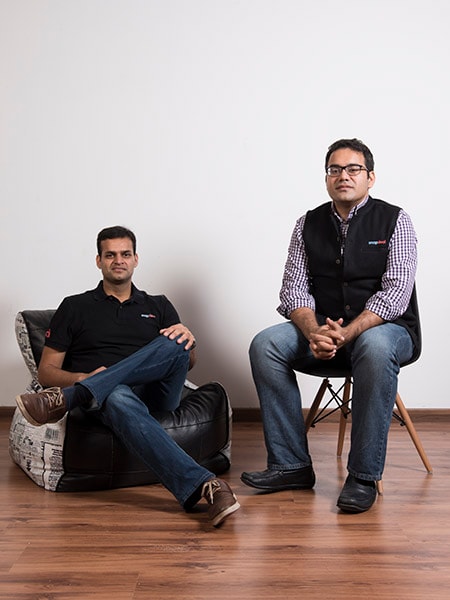
Why is the Snapdeal-Flipkart deal taking time? Are Kunal Bahl, Rohit Bansal against it?
Flipkart presented a revised deal to Snapdeal but there still seem to be some hesitations.

Image: Amit Verma
Even as much is being talked about the board of online marketplace Snapdeal having approved larger rival Flipkart’s offer of about $850 million, the deal will not fructify until the shareholders of the beleaguered online marketplace give their nod.
While SoftBank, the main proponent of the deal, owns about one-third of the company, apart from two board seats, founders Kunal Bahl and Rohit Bansal together own about 6.5% in the e-commerce company, apart from a board seat each. Bahl and Bansal’s consent is thus necessary for the deal to go through.
Kalaari Capital and Nexus Venture Partners, with about 7 percent and 9 percent stake in the company, are two other large shareholders. Both funds have agreed to the sale of Snapdeal to Flipkart.
The Snapdeal board currently comprises two SoftBank executives, Kabir Misra and Lydia Jett, the founders, Nexus Venture Partners’ Suvir Sujan and telecom veteran and Bharti Enterprises vice-chairman Akhil Gupta, who serves as an independent director. Kalaari Capital’s Vani Kola had resigned from the board in May. According to people in the know, the board has sent Flipkart's proposal to shareholders for approval. Snapdeal has about 20 shareholders.
“They (Snapdeal founders) are not letting the deal go through,” says a person with direct knowledge of the development. It is understood that Bahl and Bansal have drawn up an alternate plan to run a lean organisation with the money raised from sale of Freecharge, its wholly-owned payments subsidiary, to Axis Bank. They are regularly holding meetings with business/ vertical/ technical heads within the organisation, pushing the alternate plan.
The alternate plan or Plan B will entail running the organisation with about 200 people, which will help the company curtail employee expenses. Snapdeal currently employs about 1,200 executives.
“If the deal has got delayed till date, it is because of the founders themselves,” said a person, within the company, on the condition of anonymity. “They openly tell us that they won’t let the transaction go through,” the person added.
The transaction between Snapdeal and its larger rival Flipkart came to light in April this year (Forbes India broke the story in its edition dated April 4, 2017), following which several hurdles have emerged regarding its valuation.
Earlier this month, the Snapdeal board reportedly turned down a $700-750 million bid from Flipkart, which then revised the offer to about $850 million, about $700 million is in stocks and the rest in cash.
Flipkart and Snapdeal spokespersons did not immediately respond to emails seeking comments.
SoftBank, the largest investor in Snapdeal, has been leading the talks for the proposed sale of the ecommerce firm, and is negotiating to make a separate investment in Flipkart.
If the deal is clinched, Bahl and Bansal will have to leave the company, said a source familiar with the transaction. “The problem is, they don’t want to cease control. Also, with the sale of Freecharge, negotiations may now get tougher,” the person added.
What went wrong?
It was not long ago when Snapdeal was riding a valuation $6.5 billion. But it lost out on the race to homegrown ecommerce giant Flipkart and foreign rival Amazon as it failed to acquire an identity for itself.
In fact, Bahl and Bansal themselves had also written a letter to their employees a few months ago stating the problem. “At Snapdeal, we find ourselves at an important point in our journey - we know where we want to go and now is the time to make the choices of how we will get there....Has our company and industry been going through a troubled time? Absolutely. Did we make errors in our execution? No doubt about that......Over the last 2-3 years, with all the capital coming into this market, our entire industry, including, started making mistakes,” they had said, adding they started growing their business much before the right economic model and market fit was figured out.
So, now the crucial question - will Snapdeal founders agree to the terms and conditions of Flipkart or will the FreeCharge sale make negotiations tougher for Flipkart?
X




